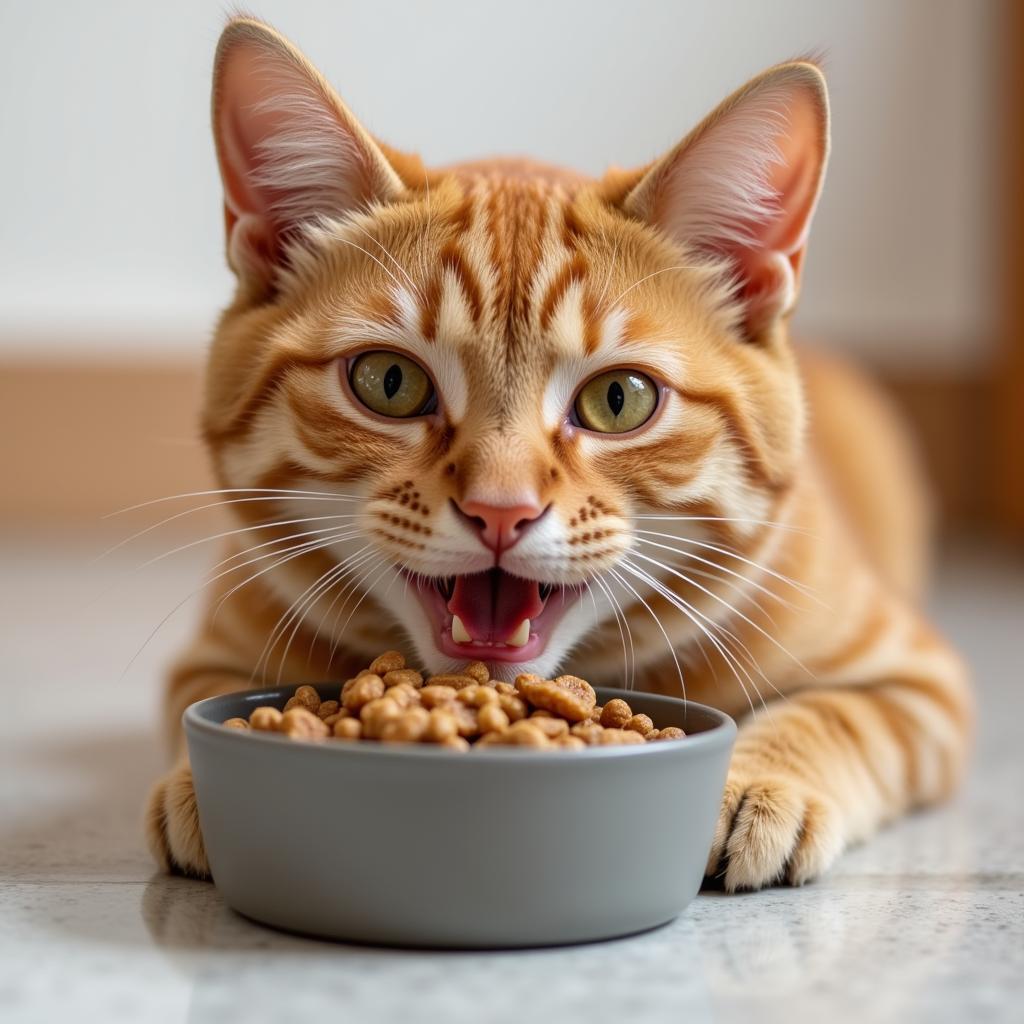Choosing the right anti-inflammatory cat food can significantly impact your cat’s comfort and overall health. Inflammation is a common culprit behind many feline ailments, from arthritis to allergies. By understanding how diet plays a role, you can make informed decisions to support your furry companion. Let’s delve into the world of anti-inflammatory cat food and discover how it can benefit your feline friend.
What is Anti-Inflammatory Cat Food?
Anti-inflammatory cat food isn’t a specific category like “dry” or “wet” food. Rather, it describes a dietary approach focused on ingredients known to reduce inflammation in cats. These diets often emphasize high-quality protein sources, omega-3 fatty acids, and antioxidants. They also minimize potential inflammatory triggers like artificial additives, fillers, and certain grains. Choosing the best anti-inflammatory cat food for your cat can significantly improve their quality of life.
 Cat Enjoying an Anti-Inflammatory Diet
Cat Enjoying an Anti-Inflammatory Diet
Key Ingredients to Look For
When selecting an anti-inflammatory cat food, keep an eye out for these beneficial ingredients:
- Omega-3 Fatty Acids: Found in fish oil and certain plant-based sources, omega-3s are potent anti-inflammatory agents. They can help manage conditions like arthritis and inflammatory bowel disease.
- Antioxidants: Ingredients like blueberries, cranberries, and spinach are rich in antioxidants that combat free radicals, which contribute to inflammation.
- High-Quality Protein: Lean protein sources like chicken, turkey, and fish provide essential amino acids for tissue repair and a strong immune system.
- Fiber: A good source of fiber can support gut health and reduce inflammation in the digestive tract.
For some great recipes utilizing the power of food as medicine, check out our collection of food as medicine recipes.
How Can Anti-Inflammatory Cat Food Help My Cat?
The benefits of incorporating anti-inflammatory cat food into your pet’s diet are numerous. Here are a few key advantages:
- Joint Health: Omega-3s can ease joint pain and stiffness associated with arthritis, improving mobility and overall comfort. Choosing the right wet food can also help with digestion, similar to the benefits outlined in our article on the best wet dog food for constipation.
- Skin and Coat Health: Omega-3s and antioxidants can reduce itching, dryness, and inflammation associated with skin allergies, promoting a healthy, shiny coat.
- Digestive Health: A diet rich in fiber and easily digestible protein can soothe the digestive tract and reduce inflammation associated with IBD.
- Overall Well-being: By reducing inflammation, these diets can contribute to a stronger immune system and improved energy levels.
Transitioning to Anti-Inflammatory Cat Food
It’s important to transition your cat to a new food gradually. Start by mixing a small amount of the new food with their current food, gradually increasing the proportion of the new food over several days. This prevents digestive upset and allows your cat to adjust to the new flavors and textures.
When Should I Consider Anti-Inflammatory Cat Food?
If your cat exhibits signs of inflammation, such as stiffness, lethargy, skin irritation, or digestive issues, consult your veterinarian. They can diagnose the underlying cause and recommend an appropriate dietary strategy, potentially including anti-inflammatory cat food.
You can also check out our article on Michigan-made food products for more locally sourced options: michigan made food products.
Conclusion
Choosing anti-inflammatory cat food can make a world of difference in your feline companion’s well-being. By focusing on ingredients that combat inflammation, you can help your cat live a more comfortable and active life. Remember to consult your veterinarian for personalized recommendations and guidance. Don’t forget to explore Dr. Karanastasis’ recommendations on beneficial foods: dr karanastasis 3 foods to eat. Also, be mindful of the worst foods for lipedema as some of these may also contribute to inflammation in pets.
FAQ
- What are the signs of inflammation in cats? Common signs include stiffness, lethargy, decreased appetite, skin irritation, and digestive problems.
- Is anti-inflammatory cat food suitable for all cats? Consult your veterinarian before making any dietary changes, especially if your cat has pre-existing health conditions.
- Can I make homemade anti-inflammatory cat food? While possible, it’s crucial to consult a veterinary nutritionist to ensure a balanced and complete diet.
- How long does it take to see results from anti-inflammatory cat food? Improvements can vary depending on the cat and the underlying condition. It may take several weeks to notice significant changes.
- What if my cat doesn’t like the new food? Try different flavors and textures or mix the new food with their current food gradually.
6.. Are there any side effects of anti-inflammatory cat food? Some cats might experience mild digestive upset during the transition period. - Where can I buy anti-inflammatory cat food? It’s available at many pet stores and online retailers, and you may find locally sourced options at farmer’s markets listed on michigan made food products.
Need further support? Contact us at Phone Number: 02437655121, Email: minacones@gmail.com or visit us at 3PGH+8R9, ĐT70A, thôn Trung, Bắc Từ Liêm, Hà Nội, Việt Nam. Our customer service team is available 24/7.